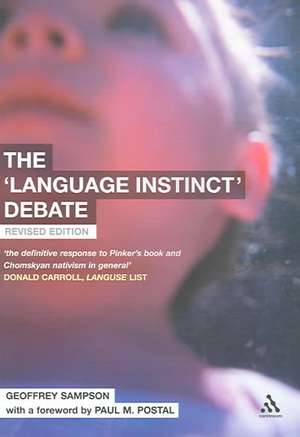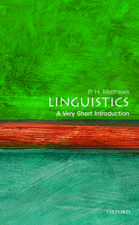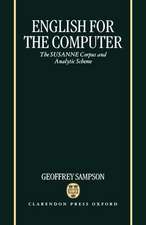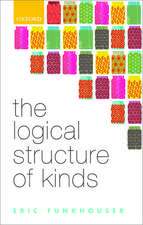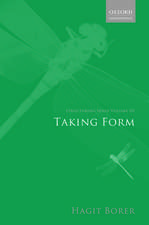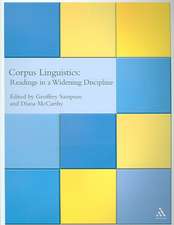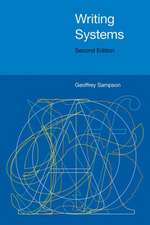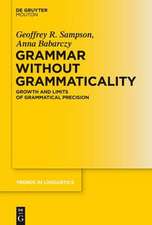The 'Language Instinct' Debate
Autor Geoffrey Sampsonen Limba Engleză Paperback – 30 apr 2005
| Toate formatele și edițiile | Preț | Express |
|---|---|---|
| Paperback (1) | 344.15 lei 43-57 zile | |
| Bloomsbury Publishing – 30 apr 2005 | 344.15 lei 43-57 zile | |
| Hardback (1) | 1129.91 lei 43-57 zile | |
| Bloomsbury Publishing – 30 apr 2005 | 1129.91 lei 43-57 zile |
Preț: 344.15 lei
Preț vechi: 386.68 lei
-11% Nou
Puncte Express: 516
Preț estimativ în valută:
65.85€ • 68.94$ • 54.49£
65.85€ • 68.94$ • 54.49£
Carte tipărită la comandă
Livrare economică 07-21 aprilie
Preluare comenzi: 021 569.72.76
Specificații
ISBN-13: 9780826473851
ISBN-10: 0826473857
Pagini: 240
Dimensiuni: 156 x 234 x 19 mm
Greutate: 0.37 kg
Ediția:Revised
Editura: Bloomsbury Publishing
Colecția Continuum
Locul publicării:London, United Kingdom
ISBN-10: 0826473857
Pagini: 240
Dimensiuni: 156 x 234 x 19 mm
Greutate: 0.37 kg
Ediția:Revised
Editura: Bloomsbury Publishing
Colecția Continuum
Locul publicării:London, United Kingdom
Cuprins
Preface1. Culture or Biology?2. The Original Arguments for a Language Instinct3. How People Really Speak4. The Debate Renewed5. The Creative Mind6. ConclusionNotesIndex
Recenzii
Title mention in Anuario Filosófico, Vol XXXIX/1 2006
"Now we have a much revised, corrected and expanded version which answers Sampson's many critics and makes ever clearer the fact that all the Chomsky and Pinker theories are not nearly as well supported as most psychologists and linguists seem to imagine. Sampson has a sharp eye for scholarly fudging of facts, illogical arguments, and towering theories tottering on weak foundations. At the very least Sampson's no-nonsense book, remarkable for its lucidity and readability in a field not notable for these virtues, forces upon us a recognition of the parlous state of a lot of linguistic argument and compels us to return the Scottish verdict of "not Proven." We realize that in linguistics the problem is not so much what we do not know as that much of what we pretend to know is simply not supported by sufficient evidence. Sampson may not bring down the temple of a false god but he has most certainly shaken the pillars. Anyone interested in language and culture will find the book captivating."- Leonard R. N. Ashley, Geolinguistics, Vol. 31 2005
"Sampson's book is worth reading, because it provides a view of how human languages work without appealing to nativist assumptions...I have recommended Pinker (1994) to my colleagues and students, and almost all of them have told me that it is one of the best books that they have read about language. Sampson agrees that Pinker's book "is superbly well written", but he also says "a book can be well written, and its conclusions quite wrong" (p. 14). I will now also recommend Sampson's book to my colleagues and students, and let them judge between the two."
"Now we have a much revised, corrected and expanded version which answers Sampson's many critics and makes ever clearer the fact that all the Chomsky and Pinker theories are not nearly as well supported as most psychologists and linguists seem to imagine. Sampson has a sharp eye for scholarly fudging of facts, illogical arguments, and towering theories tottering on weak foundations. At the very least Sampson's no-nonsense book, remarkable for its lucidity and readability in a field not notable for these virtues, forces upon us a recognition of the parlous state of a lot of linguistic argument and compels us to return the Scottish verdict of "not Proven." We realize that in linguistics the problem is not so much what we do not know as that much of what we pretend to know is simply not supported by sufficient evidence. Sampson may not bring down the temple of a false god but he has most certainly shaken the pillars. Anyone interested in language and culture will find the book captivating."- Leonard R. N. Ashley, Geolinguistics, Vol. 31 2005
"Sampson's book is worth reading, because it provides a view of how human languages work without appealing to nativist assumptions...I have recommended Pinker (1994) to my colleagues and students, and almost all of them have told me that it is one of the best books that they have read about language. Sampson agrees that Pinker's book "is superbly well written", but he also says "a book can be well written, and its conclusions quite wrong" (p. 14). I will now also recommend Sampson's book to my colleagues and students, and let them judge between the two."
